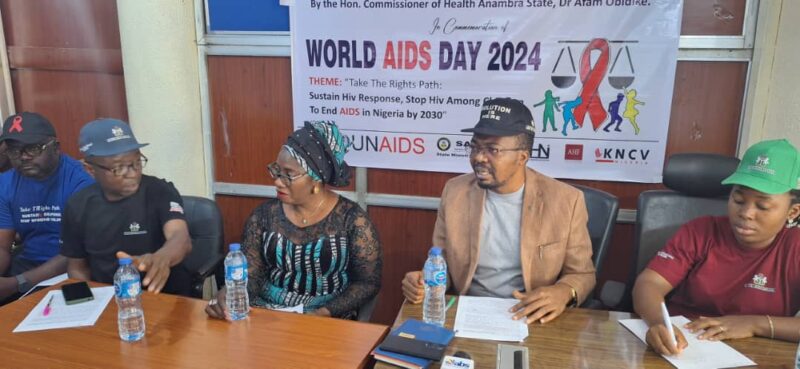Anambra Reports 3,138 New HIV Cases in 10 Month With over 3,000 new cases recorded in just 10 months, Anambra State intensifies its fight against HIV/AIDS through testing, treatment, and prevention initiatives, with 1.2% Positivity Rate
The Anambra State AIDS Control Agency (ANSACA) has disclosed a concerning rise in HIV cases, reporting that 3,138 individuals tested positive for the virus out of 257,953 people screened between January and October 2024. This equates to a 1.2% positivity rate, underscoring both the progress and the persistent challenges in the state’s battle against HIV/AIDS.
Speaking at a media briefing in Awka to commemorate World AIDS Day, Dr. Afam Obidike, Commissioner for Health in Anambra State, outlined the ongoing efforts and achievements in tackling the epidemic. This year’s global theme, “Take the Rights Path, Sustain HIV Response, Stop HIV Among Children to End AIDS in Nigeria by 2030,” highlights the urgency of combating HIV transmission and ensuring care for vulnerable groups, particularly children.
Dr. Obidike emphasized the scale of testing and treatment services now available in the state:
“Between January and October 2024, 257,953 individuals were tested for HIV, with 3,138 (1.2%) testing positive. Importantly, 99% of those diagnosed were linked to antiretroviral therapy (ART), a testament to our commitment to comprehensive care.”
Currently, 49,067 individuals living with HIV are receiving ART in the state.
Anambra State’s prevention strategies focus on collaborative efforts with partners to promote safe practices and raise awareness. As part of these initiatives:
- 1,406,744 condoms and 26,640 lubricants were distributed to key populations and the general public.
This proactive distribution underscores the government’s dedication to reducing transmission risks and encouraging safe behaviors among residents.
A significant milestone in the fight against HIV/AIDS in Anambra is the Prevention of Mother-to-Child Transmission (PMTCT) program. Efforts in 2024 have seen the testing of 56,199 antenatal attendees, with 560 HIV-positive pregnant women identified and linked to care. Advanced diagnostic tools, such as m-PIMA machines, have improved early testing for HIV-exposed infants, ensuring timely interventions that lead to healthier outcomes for mothers and children.
To combat stigma and discrimination, the state has domesticated the HIV Anti-Discrimination Act, safeguarding the rights of people living with HIV. Dr. Obidike highlighted the importance of this law:
“Anambra State is committed to fostering health equity and building an AIDS-free future for all residents. No one should face discrimination in their pursuit of care.”










Join our Channel...